Overview
- Description
- The collection consists of documents and correspondence regarding the Holocaust-era experiences of Leonie Roualet, an American imprisoned in the Vittel internment camp in France. Included is corresondence of Leonie's sister Henriette Roualet with various U.S. government agencies trying to locate Leonie and her mother, two wartime letters exchanged between Leonie and Henriette, Leonie's DP card, and documents related to her post-war involvement with the Red Cross.
- Date
-
inclusive:
1940-1954
- Credit Line
- United States Holocaust Memorial Museum Collection, Gift of Mark Roualet
- Collection Creator
- Leonie B. Roualet
- Biography
-
Leonie Berthe Roualet (1900-1978) was born in Hammondsport, New York to Leonie (née Calmesse, 1869-1942) and Henry Charles Roualet (1866-?). Leonie and Henry were both originally from France, where they worked as champagne vintners. They immigrated to New York in 1890, where they continued to work as wine merchants. Leonie Berthe was raised Catholic and had two older brothers, Georges (George, 1891-1951) and Andre (Andrew, 1894-1973), and one older sister, Henriette (1898-1969). Georges served in the U.S. Navy during World War I aboard the USS Wisconsin. After the war, the entire family moved from New York to Cleveland, Ohio.
In the 1930s, Leonie’s mother, Leonie Calmesse Roualet, returned to France to take care of her ailing brother. While caring for her brother, she too became sick, and in 1939 Leonie traveled to France to take care of her mother and her uncle. On September 1, 1939, Germany invaded Poland, and two days later France and Britain declared war on Germany, officially starting World War II. In May 1940, Germany invaded France and occupied the northern half of the country. Leonie’s sister, Henriette, began to worry about the fate of her mother and sister as she struggled to contact them, and she wrote repeatedly to the U.S. State Department for information on their whereabouts. In November, she received a telegram stating that her mother was in a hospital in Bordeaux, while her sister was living with their uncle in Épernay.
On December 11, 1941, four days after the Japanese attack on Pearl Harbor, Germany declared war on the United States. Following this declaration, German authorities began arresting American citizens in their occupied territories with the hope that they could exchange them with German citizens interned abroad. On September 24, 1942, the Gestapo arrested Leonie as an enemy alien and sent her to a prison in Châlons. From there she was transferred to Frontstalag 194 in the Vittel internment camp. In Vittel, Leonie lived in hotel-like accommodations with running water and heat. She was able to send and receive mail, and accept Red Cross packages. The Germans published propaganda photos and press stories about Vittel to showcase it as representative of conditions in German camps. Despite these improved living conditions in comparison to other German camps, Vittel was still surrounded by barbed wire and constantly patrolled by armed guards. Leonie often suffered from malnutrition while interned in the camp.
On September 12, 1944, the Vittel internment camp was liberated by Free French forces. Immediately following liberation, Leonie worked for the Red Cross and helped establish the first displaced persons (DP) camp in Paris. In December 1945, Leonie returned to the United States aboard the S.S. Gripsholm, accompanying a convoy of refugees at the request of the American Embassy. She resettled in Cleveland, reuniting with her sister, Henriette. In Cleveland, Leonie continued working for the Red Cross before becoming the director of the diocesan Catholic Resettlement Council when it was established in 1949. Working for the Council, Leonie helped resettle thousands of refugees from wars and political strife around the world.
Physical Details
- Genre/Form
- Correspondence.
- Extent
-
1 folder
- System of Arrangement
- The collection is arranged as a single folder
Rights & Restrictions
- Conditions on Access
- There are no known restrictions on access to this material.
- Conditions on Use
- The donor, source institution, or a third party has asserted copyright over some or all of these material(s). The Museum does not own the copyright for the material and does not have authority to authorize use. For permission, please contact the rights holder(s).
- Copyright Holder
- Mr. Mark Roualet
Keywords & Subjects
- Geographic Name
- Vosges (France) Paris (France)
- Personal Name
- Roualet, Leonie, 1900-1978.
- Corporate Name
- Vittel (Concentration camp) Red Cross and Red Crescent
Administrative Notes
- Holder of Originals
-
United States Holocaust Memorial Museum
- Legal Status
- Permanent Collection
- Provenance
- The collection was donated to the United States Holocaust Memorial Museum by Mark Roualet in 2018.
- Record last modified:
- 2024-03-08 07:35:25
- This page:
- https://collections.ushmm.org/search/catalog/irn627175
Download & Licensing
- In Copyright
- Terms of Use
- This record is digitized but cannot be downloaded online.
In-Person Research
- Available for Research
- Plan a Research Visit
-
Request in Shapell Center Reading Room
Bowie, MD
Contact Us
Also in Leonie Roualet collection
The collection consists of artwork, Catholic devotional objects, household objects, luggage, scrip, shoes, stamps, and documents relating to the experiences of Leonie Roualet in the Vittel internment camp in France during the Holocaust, and in France and the United States after the Holocaust.
Date: 1940-1954
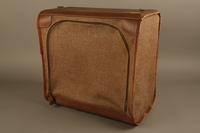
Brown cloth and leather trimmed suitcase used by an American internee
Object
Suitcase taken by Leonie Roualet to France and used while she was interned in Vittel internment camp in German-occupied France from September 1942 through September 1944, and on her return voyage to the United States. Leonie was born in New York to Leonie Calmesse and Henry Charles Roualet, French champagne vintners who had immigrated to the US in the 1890s. In the 1930s, Leonie’s mother returned to France to take care of her ailing brother. While caring for her brother, she too became sick, and in 1939 Leonie traveled to France to take care of her mother and her uncle. In May 1940, Germany invaded France and occupied the northern half of the country. Leonie’s sister, Henriette, began to worry about the fate of her mother and sister as she struggled to contact them, and she wrote repeatedly to the U.S. State Department for information on their whereabouts. In November, she received a telegram stating that her mother was in a hospital in Bordeaux, while Leonie was living with their uncle in Épernay. On September 24, 1942, the Gestapo arrested Leonie as an enemy alien and sent her to a prison in Châlons. From there she was transferred to Frontstalag 194 in Vittel. She remained there for two years until the camp was liberated by Free French forces on September 12, 1944. Immediately following liberation, Leonie worked for the Red Cross and helped establish the first displaced persons (DP) camp in Paris. In December 1945, Leonie returned to the United States, accompanying a convoy of refugees at the request of the American Embassy.
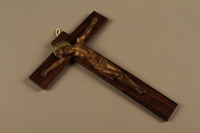
Wall crucifix owned by an American internee
Object
Crucifix owned by Leonie Roualet while she was interned in Vittel internment camp in German-occupied France from September 1942 through September 1944. Leonie was born in New York to Leonie Calmesse and Henry Charles Roualet, French champagne vintners who had immigrated to the United States in the 1890s. In the 1930s, Leonie’s mother returned to France to take care of her ailing brother. While caring for her brother, she too became sick, and in 1939 Leonie traveled to France to take care of her mother and her uncle. In May 1940, Germany invaded France and occupied the northern half of the country. Leonie’s sister, Henriette, began to worry about the fate of her mother and sister as she struggled to contact them, and she wrote repeatedly to the U.S. State Department for information on their whereabouts. In November, she received a telegram stating that her mother was in a hospital in Bordeaux, while Leonie was living with their uncle in Épernay. On September 24, 1942, the Gestapo arrested Leonie as an enemy alien and sent her to a prison in Châlons. From there she was transferred to Frontstalag 194 in Vittel. She remained there for two years until the camp was liberated by Free French forces on September 12, 1944. Immediately following liberation, Leonie worked for the Red Cross and helped establish the first displaced persons (DP) camp in Paris. In December 1945, Leonie returned to the United States, accompanying a convoy of refugees at the request of the American Embassy.
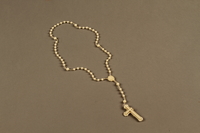
Plastic rosary used by an American internee
Object
Rosary used by Leonie Roualet while she was interned in Vittel internment camp in German-occupied France from September 1942 through September 1944. Leonie was born in New York to Leonie Calmesse and Henry Charles Roualet, French champagne vintners who had immigrated to the United States in the 1890s. In the 1930s, Leonie’s mother returned to France to take care of her ailing brother. While caring for her brother, she too became sick, and in 1939 Leonie traveled to France to take care of her mother and her uncle. In May 1940, Germany invaded France and occupied the northern half of the country. Leonie’s sister, Henriette, began to worry about the fate of her mother and sister as she struggled to contact them, and she wrote repeatedly to the U.S. State Department for information on their whereabouts. In November, she received a telegram stating that her mother was in a hospital in Bordeaux, while Leonie was living with their uncle in Épernay. On September 24, 1942, the Gestapo arrested Leonie as an enemy alien and sent her to a prison in Châlons. From there she was transferred to Frontstalag 194 in Vittel. She remained there for two years until the camp was liberated by Free French forces on September 12, 1944. Immediately following liberation, Leonie worked for the Red Cross and helped establish the first displaced persons (DP) camp in Paris. In December 1945, Leonie returned to the United States, accompanying a convoy of refugees at the request of the American Embassy.
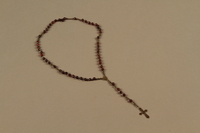
Metal and plastic rosary used by an American internee
Object
Rosary used by Leonie Roualet while she was interned in Vittel internment camp in German-occupied France from September 1942 through September 1944. Leonie was born in New York to Leonie Calmesse and Henry Charles Roualet, French champagne vintners who had immigrated to the United States in the 1890s. In the 1930s, Leonie’s mother returned to France to take care of her ailing brother. While caring for her brother, she too became sick, and in 1939 Leonie traveled to France to take care of her mother and her uncle. In May 1940, Germany invaded France and occupied the northern half of the country. Leonie’s sister, Henriette, began to worry about the fate of her mother and sister as she struggled to contact them, and she wrote repeatedly to the U.S. State Department for information on their whereabouts. In November, she received a telegram stating that her mother was in a hospital in Bordeaux, while Leonie was living with their uncle in Épernay. On September 24, 1942, the Gestapo arrested Leonie as an enemy alien and sent her to a prison in Châlons. From there she was transferred to Frontstalag 194 in Vittel. She remained there for two years until the camp was liberated by Free French forces on September 12, 1944. Immediately following liberation, Leonie worked for the Red Cross and helped establish the first displaced persons (DP) camp in Paris. In December 1945, Leonie returned to the United States, accompanying a convoy of refugees at the request of the American Embassy.
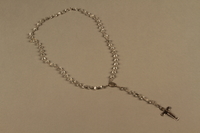
Metal and glass rosary used by an American internee
Object
Rosary used by Leonie Roualet while she was interned in Vittel internment camp in German-occupied France from September 1942 through September 1944. Leonie was born in New York to Leonie Calmesse and Henry Charles Roualet, French champagne vintners who had immigrated to the United States in the 1890s. In the 1930s, Leonie’s mother returned to France to take care of her ailing brother. While caring for her brother, she too became sick, and in 1939 Leonie traveled to France to take care of her mother and her uncle. In May 1940, Germany invaded France and occupied the northern half of the country. Leonie’s sister, Henriette, began to worry about the fate of her mother and sister as she struggled to contact them, and she wrote repeatedly to the U.S. State Department for information on their whereabouts. In November, she received a telegram stating that her mother was in a hospital in Bordeaux, while Leonie was living with their uncle in Épernay. On September 24, 1942, the Gestapo arrested Leonie as an enemy alien and sent her to a prison in Châlons. From there she was transferred to Frontstalag 194 in Vittel. She remained there for two years until the camp was liberated by Free French forces on September 12, 1944. Immediately following liberation, Leonie worked for the Red Cross and helped establish the first displaced persons (DP) camp in Paris. In December 1945, Leonie returned to the United States, accompanying a convoy of refugees at the request of the American Embassy.
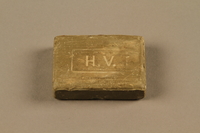
Bar of soap owned by an American internee
Object
Bar of soap acquired by Leonie Roualet while she was interned in Vittel internment camp in German-occupied France from September 1942 through September 1944. Leonie was born in New York to Leonie Calmesse and Henry Charles Roualet, French champagne vintners who had immigrated to the United States in the 1890s. In the 1930s, Leonie’s mother returned to France to take care of her ailing brother. While caring for her brother, she too became sick, and in 1939 Leonie traveled to France to take care of her mother and her uncle. In May 1940, Germany invaded France and occupied the northern half of the country. Leonie’s sister, Henriette, began to worry about the fate of her mother and sister as she struggled to contact them, and she wrote repeatedly to the U.S. State Department for information on their whereabouts. In November, she received a telegram stating that her mother was in a hospital in Bordeaux, while Leonie was living with their uncle in Épernay. On September 24, 1942, the Gestapo arrested Leonie as an enemy alien and sent her to a prison in Châlons. From there she was transferred to Frontstalag 194 in Vittel. She remained there for two years until the camp was liberated by Free French forces on September 12, 1944. Immediately following liberation, Leonie worked for the Red Cross and helped establish the first displaced persons (DP) camp in Paris. In December 1945, Leonie returned to the United States, accompanying a convoy of refugees at the request of the American Embassy.
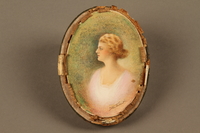
Framed portrait of a woman owned by an American internee
Object
Framed portrait owned by Leonie Roualet while she was interned in Vittel internment camp in German-occupied France from September 1942 through September 1944. Leonie was born in New York to Leonie Calmesse and Henry Charles Roualet, French champagne vintners who had immigrated to the United States in the 1890s. In the 1930s, Leonie’s mother returned to France to take care of her ailing brother. While caring for her brother, she too became sick, and in 1939 Leonie traveled to France to take care of her mother and her uncle. In May 1940, Germany invaded France and occupied the northern half of the country. Leonie’s sister, Henriette, began to worry about the fate of her mother and sister as she struggled to contact them, and she wrote repeatedly to the U.S. State Department for information on their whereabouts. In November, she received a telegram stating that her mother was in a hospital in Bordeaux, while Leonie was living with their uncle in Épernay. On September 24, 1942, the Gestapo arrested Leonie as an enemy alien and sent her to a prison in Châlons. From there she was transferred to Frontstalag 194 in Vittel. She remained there for two years until the camp was liberated by Free French forces on September 12, 1944. Immediately following liberation, Leonie worked for the Red Cross and helped establish the first displaced persons (DP) camp in Paris. In December 1945, Leonie returned to the United States, accompanying a convoy of refugees at the request of the American Embassy.
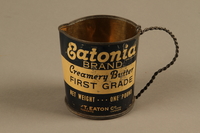
Pitcher made from an Eatonia Brand butter can and used by an American internee
Object
Can of Eatonia Brand butter repurposed as a pitcher and used by Leonie Roualet, while she was interned in Vittel internment camp in German-occupied France from September 1942 through September 1944. Leonie was born in New York to Leonie Calmesse and Henry Charles Roualet, French champagne vintners who had immigrated to the United States in the 1890s. In the 1930s, Leonie’s mother returned to France to take care of her ailing brother. While caring for her brother, she too became sick, and in 1939 Leonie traveled to France to take care of her mother and her uncle. In May 1940, Germany invaded France and occupied the northern half of the country. Leonie’s sister, Henriette, began to worry about the fate of her mother and sister as she struggled to contact them, and she wrote repeatedly to the U.S. State Department for information on their whereabouts. In November, she received a telegram stating that her mother was in a hospital in Bordeaux, while Leonie was living with their uncle in Épernay. On September 24, 1942, the Gestapo arrested Leonie as an enemy alien and sent her to a prison in Châlons. From there she was transferred to Frontstalag 194 in Vittel. She remained there for two years until the camp was liberated by Free French forces on September 12, 1944. Immediately following liberation, Leonie worked for the Red Cross and helped establish the first displaced persons (DP) camp in Paris. In December 1945, Leonie returned to the United States, accompanying a convoy of refugees at the request of the American Embassy.
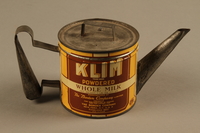
Kettle made from a can of Klim powdered milk and used by an American internee
Object
Can of Klim powdered milk repurposed as a kettle and used by Leonie Roualet, while she was interned in Vittel internment camp in German-occupied France from September 1942 through September 1944. Leonie was born in New York to Leonie Calmesse and Henry Charles Roualet, French champagne vintners who had immigrated to the United States in the 1890s. In the 1930s, Leonie’s mother returned to France to take care of her ailing brother. While caring for her brother, she too became sick, and in 1939 Leonie traveled to France to take care of her mother and her uncle. In May 1940, Germany invaded France and occupied the northern half of the country. Leonie’s sister, Henriette, began to worry about the fate of her mother and sister as she struggled to contact them, and she wrote repeatedly to the U.S. State Department for information on their whereabouts. In November, she received a telegram stating that her mother was in a hospital in Bordeaux, while Leonie was living with their uncle in Épernay. On September 24, 1942, the Gestapo arrested Leonie as an enemy alien and sent her to a prison in Châlons. From there she was transferred to Frontstalag 194 in Vittel. She remained there for two years until the camp was liberated by Free French forces on September 12, 1944. Immediately following liberation, Leonie worked for the Red Cross and helped establish the first displaced persons (DP) camp in Paris. In December 1945, Leonie returned to the United States, accompanying a convoy of refugees at the request of the American Embassy.
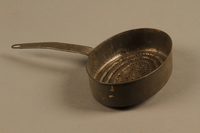
Metal strainer used by an American internee
Object
Strainer used by Leonie Roualet while she was interned in Vittel internment camp in German-occupied France from September 1942 through September 1944. Leonie was born in New York to Leonie Calmesse and Henry Charles Roualet, French champagne vintners who had immigrated to the United States in the 1890s. In the 1930s, Leonie’s mother returned to France to take care of her ailing brother. While caring for her brother, she too became sick, and in 1939 Leonie traveled to France to take care of her mother and her uncle. In May 1940, Germany invaded France and occupied the northern half of the country. Leonie’s sister, Henriette, began to worry about the fate of her mother and sister as she struggled to contact them, and she wrote repeatedly to the U.S. State Department for information on their whereabouts. In November, she received a telegram stating that her mother was in a hospital in Bordeaux, while Leonie was living with their uncle in Épernay. On September 24, 1942, the Gestapo arrested Leonie as an enemy alien and sent her to a prison in Châlons. From there she was transferred to Frontstalag 194 in Vittel. She remained there for two years until the camp was liberated by Free French forces on September 12, 1944. Immediately following liberation, Leonie worked for the Red Cross and helped establish the first displaced persons (DP) camp in Paris. In December 1945, Leonie returned to the United States, accompanying a convoy of refugees at the request of the American Embassy.
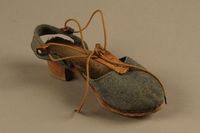
Women’s blue cloth and wood sandals worn by an American internee
Object
Pair of shoes worn by Leonie Roualet, while she was interned in Vittel internment camp in German-occupied France from September 1942 through September 1944. Leonie was born in New York to Leonie Calmesse and Henry Charles Roualet, French champagne vintners who had immigrated to the United States in the 1890s. In the 1930s, Leonie’s mother returned to France to take care of her ailing brother. While caring for her brother, she too became sick, and in 1939 Leonie traveled to France to take care of her mother and her uncle. In May 1940, Germany invaded France and occupied the northern half of the country. Leonie’s sister, Henriette, began to worry about the fate of her mother and sister as she struggled to contact them, and she wrote repeatedly to the U.S. State Department for information on their whereabouts. In November, she received a telegram stating that her mother was in a hospital in Bordeaux, while Leonie was living with their uncle in Épernay. On September 24, 1942, the Gestapo arrested Leonie as an enemy alien and sent her to a prison in Châlons. From there she was transferred to Frontstalag 194 in Vittel. She remained there for two years until the camp was liberated by Free French forces on September 12, 1944. Immediately following liberation, Leonie worked for the Red Cross and helped establish the first displaced persons (DP) camp in Paris. In December 1945, Leonie returned to the United States, accompanying a convoy of refugees at the request of the American Embassy.
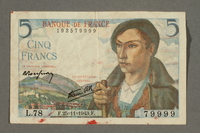
Vichy France currency, 5 franc note, acquired by an American internee
Object
Banque de France note, valued at 5 francs, distributed in Vichy France starting August 1943, and acquired by Leonie Roualet. Leonie was born in New York to Leonie Calmesse and Henry Charles Roualet, French champagne vintners who had immigrated to the United States in the 1890s. In the 1930s, Leonie’s mother returned to France to take care of her ailing brother. While caring for her brother, she too became sick, and in 1939 Leonie traveled to France to take care of her mother and her uncle. In May 1940, Germany invaded France and occupied the northern half of the country. Leonie’s sister, Henriette, began to worry about the fate of her mother and sister as she struggled to contact them, and she wrote repeatedly to the U.S. State Department for information on their whereabouts. In November, she received a telegram stating that her mother was in a hospital in Bordeaux, while Leonie was living with their uncle in Épernay. On September 24, 1942, the Gestapo arrested Leonie as an enemy alien and sent her to a prison in Châlons. From there she was transferred to Frontstalag 194 in the Vittel internment camp. She remained there for two years until the camp was liberated by Free French forces on September 12, 1944. Immediately following liberation, Leonie worked for the Red Cross and helped establish the first displaced persons (DP) camp in Paris. In December 1945, Leonie returned to the United States, accompanying a convoy of refugees at the request of the American Embassy.
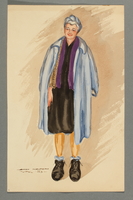
Watercolor painting of a standing woman acquired by an American internee
Object
Watercolor painting of a woman in Vittel internment camp in German-occupied France, originally owned by Gertrude Hamilton and eventually given to Leonie Roualet. Gertrude and Leonie became friends while interned together in Vittel. Both women were from the United States, but were living in France when Germany invaded in May 1940. Leonie was taking care of ailing relatives, while Gertrude worked as an ambulance driver for the American Hospital in Paris. In July 1941, Gertrude started working for the bureau for civilians set up by the YMCA (Young Men’s Christian Association), where she took care of civilians released from prison camps. On September 24, 1942, the Gestapo arrested Leonie as an enemy alien and sent her to a prison in Châlons. From there she was transferred to Frontstalag 194 in Vittel. She remained there for two years until the camp was liberated by Free French forces on September 12, 1944. Gertrude was also arrested in September 1942, and she lived in Vittel for two months before the YMCA secured permission for her release from the Germans. She was arrested again in September 1943, and sent back to Vittel for another six months. Following the liberation of Paris, Gertrude continued her work with the YMCA helping civilians released from prison camps, while Leonie worked for the Red Cross and helped establish the first displaced persons (DP) camp in Paris.
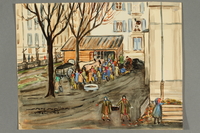
Watercolor painting of a line for wood and coal acquired by an American internee
Object
Watercolor painting of the line for wood and coal at Hotel Central in Vittel internment camp in German-occupied France, originally owned by Gertrude Hamilton and eventually given to Leonie Roualet. Gertrude and Leonie became friends while interned together in Vittel. Both women were from the United States, but were living in France when Germany invaded in May 1940. Leonie was taking care of ailing relatives, while Gertrude worked as an ambulance driver for the American Hospital in Paris. In July 1941, Gertrude started working for the bureau for civilians set up by the YMCA (Young Men’s Christian Association), where she took care of civilians released from prison camps. On September 24, 1942, the Gestapo arrested Leonie as an enemy alien and sent her to a prison in Châlons. From there she was transferred to Frontstalag 194 in Vittel. She remained there for two years until the camp was liberated by Free French forces on September 12, 1944. Gertrude was also arrested in September 1942, and she lived in Vittel for two months before the YMCA secured permission for her release from the Germans. She was arrested again in September 1943, and sent back to Vittel for another six months. Following the liberation of Paris, Gertrude continued her work with the YMCA helping civilians released from prison camps, while Leonie worked for the Red Cross and helped establish the first displaced persons (DP) camp in Paris.
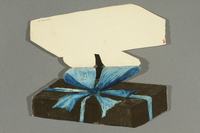
Handmade birthday card given to an American internee
Object
Handmade birthday card given to Leonie Roualet by fellow internees, while she was interned in Vittel internment camp in German-occupied France from September 1942 through September 1944. Leonie was born in New York to Leonie Calmesse and Henry Charles Roualet, French champagne vintners who had immigrated to the United States in the 1890s. In the 1930s, Leonie’s mother returned to France to take care of her ailing brother. While caring for her brother, she too became sick, and in 1939 Leonie traveled to France to take care of her mother and her uncle. In May 1940, Germany invaded France and occupied the northern half of the country. Leonie’s sister, Henriette, began to worry about the fate of her mother and sister as she struggled to contact them, and she wrote repeatedly to the U.S. State Department for information on their whereabouts. In November, she received a telegram stating that her mother was in a hospital in Bordeaux, while Leonie was living with their uncle in Épernay. On September 24, 1942, the Gestapo arrested Leonie as an enemy alien and sent her to a prison in Châlons. From there she was transferred to Frontstalag 194 in Vittel. She remained there for two years until the camp was liberated by Free French forces on September 12, 1944. Immediately following liberation, Leonie worked for the Red Cross and helped establish the first displaced persons (DP) camp in Paris. In December 1945, Leonie returned to the United States, accompanying a convoy of refugees at the request of the American Embassy.
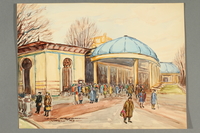
Watercolor painting of a crowd gathered in front of a decorative building in Vittel internment camp acquired by an American internee
Object
Watercolor painting of the package line in Vittel internment camp in German-occupied France, originally owned by Gertrude Hamilton and eventually given to Leonie Roualet. Gertrude and Leonie became friends while interned together in Vittel. Both women were from the United States, but were living in France when Germany invaded in May 1940. Leonie was taking care of ailing relatives, while Gertrude worked as an ambulance driver for the American Hospital in Paris. In July 1941, Gertrude started working for the bureau for civilians set up by the YMCA (Young Men’s Christian Association), where she took care of civilians released from prison camps. On September 24, 1942, the Gestapo arrested Leonie as an enemy alien and sent her to a prison in Châlons. From there she was transferred to Frontstalag 194 in Vittel. She remained there for two years until the camp was liberated by Free French forces on September 12, 1944. Gertrude was also arrested in September 1942, and she lived in Vittel for two months before the YMCA secured permission for her release from the Germans. She was arrested again in September 1943, and sent back to Vittel for another six months. Following the liberation of Paris, Gertrude continued her work with the YMCA helping civilians released from prison camps, while Leonie worked for the Red Cross and helped establish the first displaced persons (DP) camp in Paris.
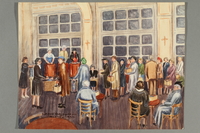
Watercolor painting of people in line for lunch acquired by an American internee
Object
Watercolor painting of the dining room during lunch at Vittel internment camp in German-occupied France, originally owned by Gertrude Hamilton and eventually given to Leonie Roualet. Gertrude and Leonie became friends while interned together in Vittel. Both women were from the United States, but were living in France when Germany invaded in May 1940. Leonie was taking care of ailing relatives, while Gertrude worked as an ambulance driver for the American Hospital in Paris. In July 1941, Gertrude started working for the bureau for civilians set up by the YMCA (Young Men’s Christian Association), where she took care of civilians released from prison camps. On September 24, 1942, the Gestapo arrested Leonie as an enemy alien and sent her to a prison in Châlons. From there she was transferred to Frontstalag 194 in Vittel. She remained there for two years until the camp was liberated by Free French forces on September 12, 1944. Gertrude was also arrested in September 1942, and she lived in Vittel for two months before the YMCA secured permission for her release from the Germans. She was arrested again in September 1943, and sent back to Vittel for another six months. Following the liberation of Paris, Gertrude continued her work with the YMCA helping civilians released from prison camps, while Leonie worked for the Red Cross and helped establish the first displaced persons (DP) camp in Paris.
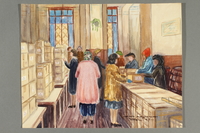
Watercolor painting of women collecting Red Cross packages acquired by an American internee
Object
Watercolor painting of women receiving Red Cross packages at Vittel internment camp in German-occupied France, originally owned by Gertrude Hamilton and eventually given to Leonie Roualet. Gertrude and Leonie became friends while interned together in Vittel. Both women were from the United States, but were living in France when Germany invaded in May 1940. Leonie was taking care of ailing relatives, while Gertrude worked as an ambulance driver for the American Hospital in Paris. In July 1941, Gertrude started working for the bureau for civilians set up by the YMCA (Young Men’s Christian Association), where she took care of civilians released from prison camps. On September 24, 1942, the Gestapo arrested Leonie as an enemy alien and sent her to a prison in Châlons. From there she was transferred to Frontstalag 194 in Vittel. She remained there for two years until the camp was liberated by Free French forces on September 12, 1944. Gertrude was also arrested in September 1942, and she lived in Vittel for two months before the YMCA secured permission for her release from the Germans. She was arrested again in September 1943, and sent back to Vittel for another six months. Following the liberation of Paris, Gertrude continued her work with the YMCA helping civilians released from prison camps, while Leonie worked for the Red Cross and helped establish the first displaced persons (DP) camp in Paris.
Czechoslovakian postage stamp, 40 haléř, acquired by a former American internee
Object
Commemorative postage stamp of Hungarian astronomer, Maximilian Hell, issued in Czechoslovakia in 1970 on the 250th anniversary of Hell’s birth and acquired by Leonie Roualet. The stamp depicts Hell on his scientific expedition in Norway to establish the distance between the earth and the sun. Leonie was born in New York to Leonie Calmesse and Henry Charles Roualet, French champagne vintners who had immigrated to the United States in the 1890s. In the 1930s, Leonie’s mother returned to France to take care of her ailing brother. While caring for her brother, she too became sick, and in 1939 Leonie traveled to France to take care of her mother and her uncle. In May 1940, Germany invaded France and occupied the northern half of the country. On September 24, 1942, the Gestapo arrested Leonie as an enemy alien and sent her to a prison in Châlons. From there she was transferred to Frontstalag 194 in the Vittel internment camp. She remained there for two years until the camp was liberated by Free French forces on September 12, 1944. Immediately following liberation, Leonie worked for the Red Cross and helped establish the first displaced persons (DP) camp in Paris. In December 1945, Leonie returned to the United States, accompanying a convoy of refugees at the request of the American Embassy. She settled in Cleveland, becoming director of the diocesan Catholic Resettlement Council, and helping resettle thousands of refugees from wars and political strife around the world.
Czechoslovakian postage stamp, 1 koruna, acquired by a former American internee
Object
Commemorative postage stamp of Czechoslovakian President, Ludvík Svoboda, issued in 1970 and acquired by Leonie Roualet. Svoboda served as president from 1968-1975, and was regarded as a national hero for his military service in both World Wars. Leonie was born in New York to Leonie Calmesse and Henry Charles Roualet, French champagne vintners who had immigrated to the United States in the 1890s. In the 1930s, Leonie’s mother returned to France to take care of her ailing brother. While caring for her brother, she too became sick, and in 1939 Leonie traveled to France to take care of her mother and her uncle. In May 1940, Germany invaded France and occupied the northern half of the country. On September 24, 1942, the Gestapo arrested Leonie as an enemy alien and sent her to a prison in Châlons. From there she was transferred to Frontstalag 194 in the Vittel internment camp. She remained there for two years until the camp was liberated by Free French forces on September 12, 1944. Immediately following liberation, Leonie worked for the Red Cross and helped establish the first displaced persons (DP) camp in Paris. In December 1945, Leonie returned to the United States, accompanying a convoy of refugees at the request of the American Embassy. She settled in Cleveland, becoming director of the diocesan Catholic Resettlement Council, and helping resettle thousands of refugees from wars and political strife around the world.
French Catholic prayer book with ivory covers used by an American internee
Object
Catholic prayer book, Paroissien Romain, owned by Leonie Roualet while she was interned in Vittel internment camp in German-occupied France from September 1942 through September 1944. Leonie was born in New York to Leonie Calmesse and Henry Charles Roualet, French champagne vintners who had immigrated to the United States in the 1890s. In the 1930s, Leonie’s mother returned to France to take care of her ailing brother. While caring for her brother, she too became sick, and in 1939 Leonie traveled to France to take care of her mother and her uncle. In May 1940, Germany invaded France and occupied the northern half of the country. Leonie’s sister, Henriette, began to worry about the fate of her mother and sister as she struggled to contact them, and she wrote repeatedly to the U.S. State Department for information on their whereabouts. In November, she received a telegram stating that her mother was in a hospital in Bordeaux, while Leonie was living with their uncle in Épernay. On September 24, 1942, the Gestapo arrested Leonie as an enemy alien and sent her to a prison in Châlons. From there she was transferred to Frontstalag 194 in Vittel. She remained there for two years until the camp was liberated by Free French forces on September 12, 1944. Immediately following liberation, Leonie worked for the Red Cross and helped establish the first displaced persons (DP) camp in Paris. In December 1945, Leonie returned to the United States, accompanying a convoy of refugees at the request of the American Embassy.



